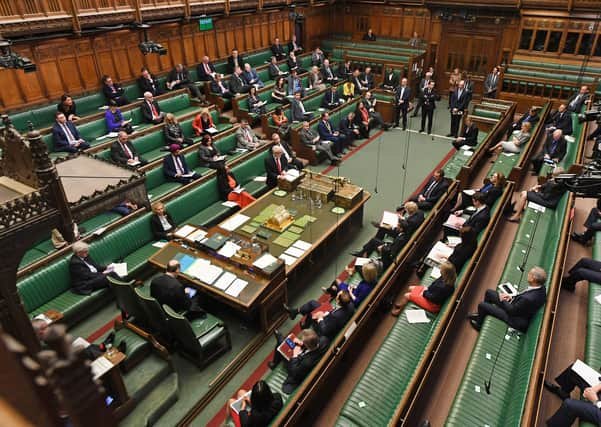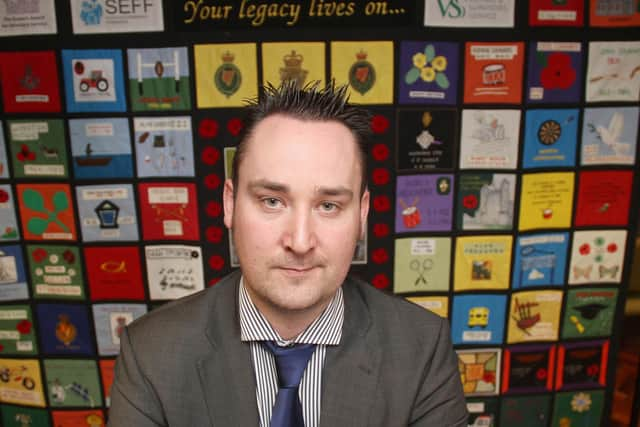Victims group: ‘This new legacy plan moves us to an amnesty in all but name’


Kenny Donaldson, of Innocent Victims United, was speaking after London yesterday retreated significantly from comprehensive proposals to deal with unresolved issues arising from the Troubles.
Mr Donaldson said: “We will take time to consider these latest proposals and will be seeking further clarity on what is, very scant commentary.”
Advertisement
Hide AdAdvertisement
Hide AdThe Northern Ireland Office said that it wanted to end the cycle of re-investigations “that has failed victims and veterans alike”.


The proposed Stormont House Agreement structures, drawn up in 2014, included a major Historical Investigations Unit (HIU) that was going to examine killings on a large scale, as well as other bodies such as a commission for information retrieval and an oral archive.
The proposals became increasingly controversial among unionists, victims of terrorism and defenders of the security forces, who feared that they would turn against the state — even the HIU — despite the fact that republican terrorists killed more people than any other group in decades of violence.
The government said yesterday that the Stormont House deal of 2014 was an important milestone “but did not stop the debate continuing”.
Advertisement
Hide AdAdvertisement
Hide AdIt said a new approach to legacy will now place a greater emphasis on gathering information for families, “moving at a faster pace to retrieve knowledge before it is lost”.
It is planning one independent body to manage both the information recovery and investigative aspects of the legacy system.
Mr Donaldson said: “There is however a thread which runs through the proposals which is moving away from an investigative approach to truth and information recovery.
“This coupled with a reference to crimes essentially being removed from the statute book once they’ve been examined through the new commission brings us into the territory of amnesty in all but name.”
Advertisement
Hide AdAdvertisement
Hide AdHe also noted the Irish government’s reaction to the latest proposals. “They have plenty to say except of course on what they intend to do to advance these issues. That state remains in denial of its legal and moral obligations to its own citizens but also to many NI citizens who had loved ones murdered as a result of cross-border terrorism.”
Mr Donaldson said: “There is no evidence to suggest that those within proscribed terrorist organisations will tell the truth or provide information to the innocents they wronged. Without a formal acknowledgement of the wrong and illegitimacy of violence there is no foundation for such a conversion to happen.
“Our concern is for our constituency of victims/survivors who we are adamant will not be once again used as collateral damage by a UK government prepared to sacrifice their legitimate needs and fundamental rights to advance their own interests and to further placate terrorism.
“We will be launching our own alternative proposal next week and we would ask that the UK government engage seriously with the plan which is rooted in the principle of advancing natural justice for all innocents, whether impacted by terrorist violence or by the actions of individual members of the security forces who through due process are then found to have committed a criminal act(s).”
Advertisement
Hide AdAdvertisement
Hide AdMr Donaldson said: “We will continue to stand up for the needs of our constituency who have been failed and disregarded.
“The UK government and others need to get serious, Reconciliation will not happen unless and until there is account taken of the past - we must see individual and collective remorse, repentance and restitution in action, paving the way for forgiveness and reconciliation to be possible.
“We have also taken time to consider the Republic of Ireland State’s response to these latest proposals. They have plenty to say except of course on what they intend to do to advance these issues.
“That state remains in denial of its’ legal and moral obligations to its own citizens but also to many NI citizens who had loved ones murdered as a result of cross-border terrorism.”
Advertisement
Hide AdAdvertisement
Hide AdThe announcement from the government yesterday did not make clear what will happen to a controversial plan to leave ex RUC subject to ‘police misconduct’ investigations but this is not thought to form part of the new body.
The statement said that the government wants to focus on a process that provides “reconciliation, delivers for victims, and ends the cycle of reinvestigations into the Troubles in Northern Ireland that has failed victims and veterans alike — ensuring equal treatment of Northern Ireland veterans and those who served overseas.
Doug Beattie of the Ulster Unionist Party said that the party welcomed the change of approach, because it had issued repeated warnings about the Stormont House plan. Kenny Donaldson of Innocent Victims United was wary of the plan as in effect an amnesty (see below).
Nationalists were highly critical of the statement.
Ireland deputy premier Simon Coveney said: “There should be effective investigations into all Troubles-related deaths, regardless of the perpetrator ... victims and survivors have had to wait for far too long for a suitable and effective system in Northern Ireland to deal with the legacy of the Troubles.”
Advertisement
Hide AdAdvertisement
Hide AdThe Sinn Fein Deputy First Minister Michelle O’Neill said: “What is being proposed is not the implementation of Stormont House as committed to in the New Decade, New Approach document, nor is it fully human rights compliant.”
Colum Eastwood MP, the SDLP leader, Colum Eastwood said it was “an act of spectacular bad faith” to try to undermine previous agreements.
• See letters and Morning View